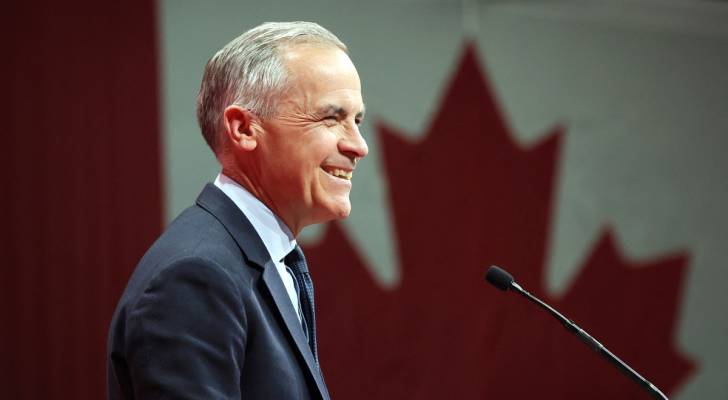Newly elected Canadian Prime Minister, Mark Carney (Credit: AFP)
Who is Mark Carney, Canada’s newly elected Prime Minister?
Mark Carney, the former governor of both the Bank of Canada and the Bank of England, has officially stepped into the political spotlight, securing a decisive win in Canada’s recent federal election to become the country’s new prime minister.
Carney was sworn in last month following the resignation of Justin Trudeau, but quickly called a snap election in hopes of securing his own mandate. Canadians responded at the ballot box on Monday, delivering a victory to a candidate with an unusually technocratic résumé and no prior political office.
Read more: Under threat from Trump, Canada calls snap elections
The 60-year-old economist, known internationally for steering Canada through the 2008 financial crash and later modernizing the Bank of England, leaned heavily on his crisis management experience throughout the campaign. “I know how to manage crises,” he said during a leadership debate. “In a situation like this, you need experience in terms of crisis management, you need negotiating skills.”
Carney’s rapid ascent to political leadership was capped in March when he won the Liberal Party’s leadership race, defeating fellow contender and former finance minister Chrystia Freeland in a landslide.
- Background -
Born in the remote town of Fort Smith in the Northwest Territories, Carney’s early life is far from typical for a global financial heavyweight. He is the son of a high school principal, attended Harvard on a scholarship, and went on to complete a PhD in economics at Oxford University.
His doctoral supervisor, Meg Meyer, described him as “an extraordinarily versatile student, rapidly mastering new approaches, perspectives and challenges,” adding that these strengths would be crucial “as he leads Canada during these turbulent times.”
Carney holds Irish and Canadian citizenships, and previously acquired British citizenship in 2018. However, he has said he will relinquish both Irish and British nationalities, emphasizing that Canada’s leader “should only hold Canadian citizenship.”
- Career -
Carney’s transition from global finance to national politics comes with both praise and scrutiny. During his time at the Bank of Canada, he gained wide respect for stabilizing the economy during the 2008 crisis by slashing interest rates and maintaining transparency on future policy—a move credited with keeping Canadian investment afloat.
In 2013, Carney became the first non-Brit to head the Bank of England, where he introduced policies such as “forward guidance” and led the Bank through the Brexit turmoil. His clear communication during market panic earned him accolades, though not without controversy—an MP once likened him to an “unreliable boyfriend” over mixed messages on interest rate policy.
Though central bankers are usually tight-lipped, Carney has grown more candid, especially in relation to US President Donald Trump. Responding to Trump’s repeated jabs at Canada and suggestions that it could become “the 51st state,” Carney remarked, “I view this as the sort of Voldemort of comments… I will not even repeat it, but you know what I’m talking about.”
He has pledged to maintain counter-tariffs in response to US trade aggression “until the Americans show us respect … and [make] credible and reliable commitments to free and fair trade.”
- Campaign focus: economy, climate, and immigration -
On the domestic front, Carney has already made bold moves. One of his first actions as prime minister was scrapping Trudeau’s controversial carbon tax, effective April 1. “This will make a difference to hard-pressed Canadians,” he said, though he has historically supported similar environmental initiatives.
In 2019, Carney became a UN special envoy on climate change, and in 2021 he helped launch the Glasgow Financial Alliance for Net Zero, an initiative linking financial institutions in the fight against climate change. He now proposes turning Canada into a “clean and conventional” energy powerhouse, calling himself a “pragmatist” when challenged on the balance between energy development and environmental sustainability.
Read more: Former central banker favored to replace Trudeau as Canada PM
On immigration, Carney supports scaling back intake targets to reduce pressure on the country’s housing and healthcare systems, echoing debates that surged during Trudeau’s final year in office.
Despite his polished credentials, Carney has faced criticism from political opponents. Conservatives accuse him of downplaying his involvement in Brookfield Asset Management’s relocation from Toronto to New York—a decision he claims occurred after his departure from the firm’s board. They have also pressed him on financial transparency, though Carney insists he is in full compliance with ethics rules and has placed his assets in a blind trust.




